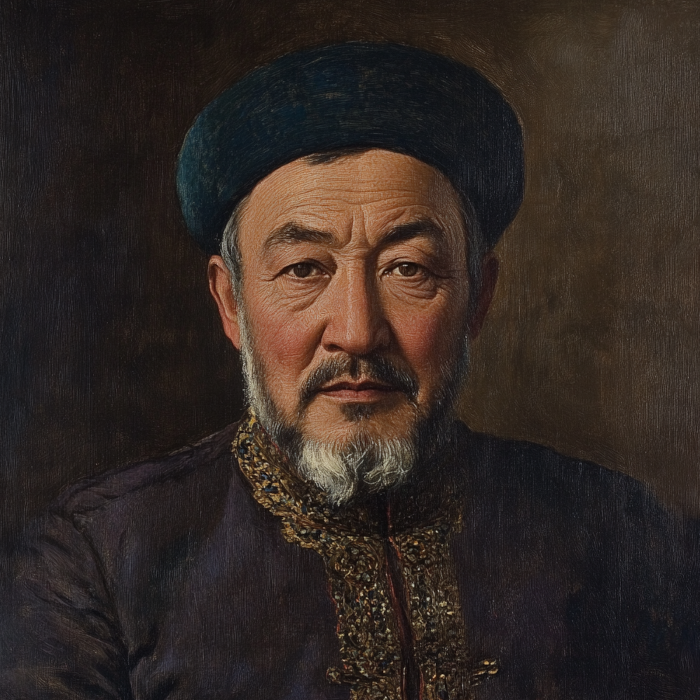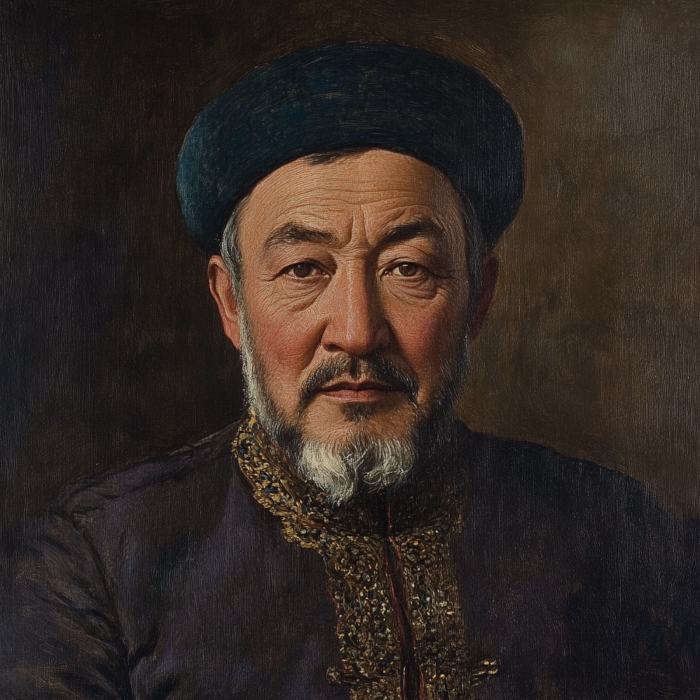


Abai Kunanbayev (1845–1904), also known as Abai Qunanbaiuly, was a Kazakh poet, composer, philosopher, and cultural reformer who played a key role in the cultural and intellectual development of Kazakhstan. He is considered one of the most important figures in Kazakh literature and Kazakh cultural history, often called the "father of Kazakh literature". Abai sought to modernize Kazakh society and emphasized the importance of education, culture, and moral development. His works, which include poetry, philosophical essays, and translations of major Russian and Western literary works, had a profound influence on the cultural identity of the Kazakh people.
Birth and Family: Abai Kunanbayev was born on August 10, 1845, in the Chingiz Mountains of what is now the Abai District in the East Kazakhstan Region. He was born into a noble family; his father, Kunanbai Oskenbaiuly, was a wealthy and influential leader of the Tobykty clan. His mother, Ulzhan, was known for her intelligence and kindness, while his grandmother, Zere, played an important role in his early upbringing.
Education and Early Influences: Abai was educated in both traditional Kazakh and Islamic teachings. He studied at a madrasa (Islamic school) in Semey and learned Arabic, Persian, and Chagatai (a classical Turkic literary language), which enabled him to read and study Islamic texts as well as Persian poetry. Abai’s father wanted him to become involved in local politics, but he had a passion for literature and intellectual pursuits. Abai was also influenced by Kazakh oral traditions, including epic poetry, proverbs, and folklore, which were integral parts of Kazakh culture.
Exposure to Russian Literature: Abai's worldview began to change as he became exposed to Russian culture and literature. During his time in Semey, he made connections with Russian political exiles and intellectuals, including members of the Russian intelligentsia, who had been exiled to Kazakhstan. This exposure led him to study the works of prominent Russian writers and thinkers, such as Alexander Pushkin, Mikhail Lermontov, Leo Tolstoy, and Fyodor Dostoevsky. This influence was significant in shaping Abai’s vision of progress, reform, and the development of Kazakh society.
Poetry and Cultural Reform: Abai Kunanbayev is known for his poetry, which blends traditional Kazakh forms with new themes influenced by Russian and Western literature. His poems addressed themes such as education, morality, human nature, and social justice, often advocating for the enlightenment of the Kazakh people. Abai's poetry reflects his concerns about the stagnation of Kazakh society and the need for cultural renewal. He was critical of ignorance, corruption, and the decline of moral values, and he sought to encourage his fellow Kazakhs to embrace knowledge, education, and progress.
Philosophical Works: Abai is also known for his philosophical work, "The Book of Words" (Kazakh: Qara Sózder), a collection of 45 short essays or reflections that discuss various aspects of life, morality, culture, and society. In "The Book of Words," Abai shares his thoughts on the nature of humanity, the importance of education, the role of leadership, and the challenges facing the Kazakh people. He wrote in a straightforward, conversational style, making complex ideas accessible to a broad audience. These essays have had a lasting influence on Kazakh culture and are still widely read and studied today.
Advocacy for Education and Enlightenment: A central theme of Abai's work was the importance of education and enlightenment. He believed that education was the key to the progress of the Kazakh people and the path to overcoming ignorance and backwardness. He encouraged Kazakhs to study not only their own cultural heritage but also the knowledge and ideas of other cultures. Abai viewed literature, science, and intellectual development as crucial for the well-being and advancement of his people.
Critique of Society: In his poetry and essays, Abai often criticized the traditional nomadic lifestyle of the Kazakhs and the feudal system that dominated society. He was critical of the bii (local judges) and bais (wealthy landowners) who abused their power, as well as the lack of unity among Kazakh clans. He believed that these divisions hindered the progress of the Kazakh people and made them vulnerable to external influence and control.
Translations of Russian and Western Works: Abai Kunanbayev played an important role in bringing Russian and Western literature to the Kazakh people through his translations. He translated the works of Alexander Pushkin, Mikhail Lermontov, Johann Wolfgang von Goethe, and others into Kazakh, making these works accessible to his compatriots. His translations not only introduced new literary forms and ideas to Kazakh readers but also fostered a greater understanding of global literary and cultural trends.
Impact on Kazakh Language and Literature: Abai's contributions had a profound impact on the Kazakh language and its development as a literary language. He enriched the language by incorporating new forms of expression and broadening its vocabulary. His blending of traditional Kazakh oral poetic forms with influences from Russian and Western literature helped establish a modern Kazakh literary tradition. Abai’s emphasis on individual introspection and philosophical inquiry marked a significant departure from the oral epic tradition that had previously dominated Kazakh literature.
Family and Personal Challenges: Abai’s personal life was marked by challenges and tragedies. He faced opposition from traditionalists who resisted his ideas and reforms. He also experienced personal loss, including the deaths of several of his children, which affected him deeply and influenced the somber tone of some of his later works. Despite these hardships, Abai remained committed to his vision of reform and enlightenment for the Kazakh people.
Legacy and Death: Abai Kunanbayev passed away on July 6, 1904, in his birthplace in the Chingiz Mountains. His death marked the end of a significant era in Kazakh cultural history, but his legacy has endured as a guiding force for the development of Kazakh national identity. He is regarded as a cultural and intellectual leader who sought to bring the Kazakh people into the modern age while preserving their unique cultural heritage.
National Symbol: Abai Kunanbayev is celebrated as a national symbol of Kazakhstan. His works have become a source of national pride, and his influence on Kazakh culture and literature is immeasurable. He is often seen as a bridge between traditional Kazakh culture and modernity, embodying the values of education, intellectual curiosity, and cultural renewal. His ideas continue to inspire generations of Kazakh writers, artists, and thinkers.
Cultural Renaissance: Abai's contributions to Kazakh literature were pivotal in initiating a cultural renaissance in Kazakhstan. He is considered the founder of modern Kazakh literature, and his efforts to promote education and reform laid the foundation for subsequent cultural and intellectual movements in Kazakhstan. During the Soviet era, Abai's works were celebrated as symbols of national identity, and his emphasis on enlightenment and cultural progress was embraced as part of Kazakhstan's heritage.
Influence on Modern Kazakhstan: In modern Kazakhstan, Abai’s legacy is deeply embedded in the national consciousness. Abai Kazakh National Pedagogical University in Almaty is named in his honor, as are many streets, squares, and cultural institutions throughout Kazakhstan. His image has appeared on Kazakh currency, and August 10 is celebrated as "Abai Day" in Kazakhstan, commemorating his contributions to Kazakh culture and society.
Monuments and Honors: Abai’s legacy is also preserved through monuments and cultural institutions dedicated to him. Statues of Abai can be found in major cities across Kazakhstan, and there is a museum dedicated to his life and work in the Abai Region. His works are studied in schools and universities across the country, and he is regarded as a source of inspiration for Kazakhs striving to maintain their cultural identity in a rapidly changing world.
Abai Kunanbayev was a poet, philosopher, and reformer whose contributions to Kazakh culture and literature have left an indelible mark on the nation. Through his poetry, essays, and translations, Abai sought to modernize Kazakh society and inspire his people to embrace education, cultural growth, and enlightenment. His criticism of societal ills, emphasis on moral and intellectual development, and efforts to bridge the gap between traditional Kazakh culture and modern influences have made him an enduring symbol of cultural renewal in Kazakhstan.
Abai’s legacy as the father of Kazakh literature continues to inspire new generations, and his vision for a more enlightened and educated society remains relevant to this day. His works are a testament to the power of literature and philosophy in shaping national identity, and his influence continues to be celebrated not only in Kazakhstan but also throughout the broader Turkic world.

We use cookies
We use cookies and other tracking technologies to improve your browsing experience on our website, to show you personalized content and targeted ads, to analyze our website traffic, and to understand where our visitors are coming from. Privacy Policy.